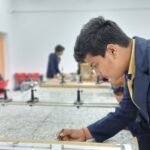Preschool education is a critical phase in a child’s development, laying the foundation for their lifelong learning journey. The early years are a time of rapid brain development, curiosity, and the acquisition of essential skills. A high-quality preschool education equips children with the tools they need to thrive academically, socially, and emotionally. In this blog, we will explore the power of preschool education in building strong foundations and setting children on a path of lifelong learning and success.
- Development of Social Skills and Emotional Intelligence: Preschool provides a nurturing environment for children to develop social skills and emotional intelligence. Through interactions with peers and teachers, children learn how to communicate effectively, share, take turns, and collaborate. They also gain a deeper understanding of their emotions and learn to manage them appropriately. These social and emotional skills lay the groundwork for building positive relationships, resolving conflicts, and navigating the complexities of the social world.
- Language and Cognitive Development: Preschool plays a pivotal role in developing language and cognitive skills. Through engaging activities and experiences, children expand their vocabulary, develop early literacy skills, and enhance their cognitive abilities such as problem-solving, critical thinking, and memory retention. They explore various subjects, engage in hands-on learning, and develop a love for knowledge and exploration.
- Encouraging Curiosity and Creativity: Preschool education fosters curiosity and creativity, fueling a child’s natural inclination to explore, discover, and imagine. Through play-based learning, artistic activities, and open-ended tasks, children are encouraged to think creatively, express themselves, and explore their interests. This cultivates a lifelong love for learning, nurtures innovation, and supports the development of a well-rounded individual.
- Building Independence and Self-Confidence: Preschool offers children opportunities to develop independence and self-confidence. As they engage in age-appropriate tasks and activities, they learn to make choices, solve problems, and take responsibility for their actions. Teachers provide guidance and support, empowering children to trust their abilities, make decisions, and believe in themselves. This fosters a strong sense of self-esteem and prepares children for future challenges and successes.
- Preparation for School and Lifelong Learning: Preschool acts as a bridge between home and formal schooling, preparing children for a smooth transition into primary education. By familiarizing children with routines, classroom environments, and basic academic concepts, preschool lays the groundwork for a seamless educational journey. Moreover, it instills a love for learning, cultivates a growth mindset, and fosters the skills and attitudes necessary for lifelong learning.
Preschool education is a powerful phase in a child’s life, shaping their development and setting the stage for lifelong learning. Through the nurturing of social skills, language development, curiosity, creativity, independence, and self-confidence, preschool provides the building blocks for future success.
In summary, preschool education offers a multitude of benefits, including the development of social skills, language and cognitive abilities, curiosity, creativity, independence, and self-confidence. It prepares children for school and establishes a strong foundation for lifelong learning. Investing in high-quality preschool education sets children on a path to thrive academically, socially, and emotionally throughout their lives.




















One thought on “The Power of Preschool Education: Building Strong Foundations for Lifelong Learning”